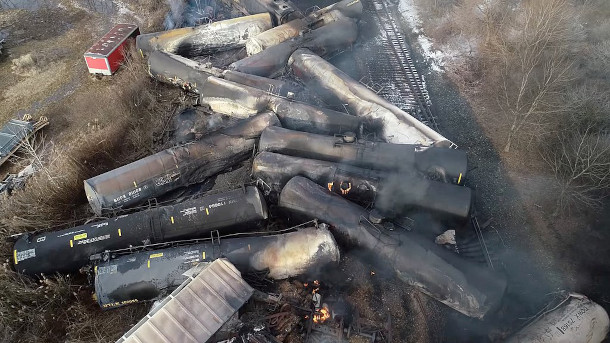EPA Drops the Ball in East Palestine
Air Date: Week of March 17, 2023

Drone footage shows the freight train derailment in East Palestine, Ohio, February 6, 2023. (Photo: National Transportation Safety Board, public domain)
The people of East Palestine, Ohio were left in the dark about toxic chemical risks in the wake of the fiery train derailment, says Judith Enck, a former regional administrator of the EPA. Her commentary calls out the EPA’s delayed and weak response and urges the agency to take steps to regain the public’s trust.
Transcript
CURWOOD: The train derailment in East Palestine, Ohio in February sparked fires and dumped toxic chemicals into the water, soil, and air. And to avoid a potentially catastrophic explosion local authorities drained more than 100,000 gallons of deadly vinyl chloride into a ditch and set it on fire. Local people are concerned for their health as the burning of vinyl chloride can change its chemistry and convert it into the highly toxic chemical family of dioxins. The Environmental Protection Agency has been slow and weak to respond, according to commentator Judith Enck, a former regional administrator of the EPA.
ENCK: When they burned the vinyl chloride officials didn’t mention the plume that could rain down dioxins and other enduring poisons in the region. And two days after the burn, residents in the evacuation zone were allowed back into their homes — before any testing for dioxins and other contaminants on the surfaces inside had been done.
Dioxins are some of the most potent carcinogens on earth — there’s no “safe” dose for humans, and pregnant women and young children are especially vulnerable to their effects.
But even now, more than a month after the derailment, the people of East Palestine don’t have solid information about the risks they and their families face — whether they have already been exposed, what they should be doing to avoid future exposure and whether they just need to move.
The Environmental Protection Agency should have ordered comprehensive testing the very day of the burn. It should have told residents, especially pregnant women and families with young children, not to return home until it was safe to do so. Instead, it timidly stood back, leaving local authorities, corporate interests and rumors to fill the void.
In lieu of a comprehensive plan, the E.P.A. appears to be playing a game of crisis whack-a-mole, waiting and then responding to the news cycle. This is no way to safeguard our communities.

Judith Enck is founder and President of Beyond Plastics, Professor at Bennington College in Vermont and former Regional Administrator for Region 2 of the EPA. (Photo Courtesy of Judith Enck)
In a situation like this, the E.P.A. should immediately conduct authoritative tests and come up with a plan to address any dangers, and communicate all of it loudly and clearly to the affected communities. Instead it waited a full month, and then, amid public outrage, asked the railroad company to test for dioxins and come up with a plan.
This is a terrible approach, the interests of a company accused of polluting are quite obviously distinct from those of the public.
By acting as a reluctant regulator, the E.P.A. has left the residents of East Palestine and the surrounding areas desperate for answers. These are people who are concerned for their health, the safety of their own homes and the well-being of their children. They deserve better.
The E.P.A. needs to take two actions now.
First, it needs to conduct comprehensive environmental testing for dioxins in and around East Palestine.
Second, the E.P.A. needs to establish federally funded medical monitoring for everyone along the plume. Even those who appear healthy now should be offered baseline testing.
Whether you live in a blue, red or purple state, the E.P.A. should work aggressively to protect your health and the health of your families during environmental emergencies. The people of East Palestine and their neighbors have been through a lot. The E.P.A. will need to work hard to regain their trust.
CURWOOD: Judith Enck is founder of Beyond Plastics and a former regional administrator for the EPA.
Links
Watch “The True Cost of Plastics” video from Beyond Plastics
Find EPA updates on the emergency response to the East Palestine, Ohio train derailment
Living on Earth wants to hear from you!
Living on Earth
62 Calef Highway, Suite 212
Lee, NH 03861
Telephone: 617-287-4121
E-mail: comments@loe.org
Newsletter [Click here]
Donate to Living on Earth!
Living on Earth is an independent media program and relies entirely on contributions from listeners and institutions supporting public service. Please donate now to preserve an independent environmental voice.
NewsletterLiving on Earth offers a weekly delivery of the show's rundown to your mailbox. Sign up for our newsletter today!
 Sailors For The Sea: Be the change you want to sea.
Sailors For The Sea: Be the change you want to sea.
 The Grantham Foundation for the Protection of the Environment: Committed to protecting and improving the health of the global environment.
The Grantham Foundation for the Protection of the Environment: Committed to protecting and improving the health of the global environment.
 Contribute to Living on Earth and receive, as our gift to you, an archival print of one of Mark Seth Lender's extraordinary wildlife photographs. Follow the link to see Mark's current collection of photographs.
Contribute to Living on Earth and receive, as our gift to you, an archival print of one of Mark Seth Lender's extraordinary wildlife photographs. Follow the link to see Mark's current collection of photographs.
 Buy a signed copy of Mark Seth Lender's book Smeagull the Seagull & support Living on Earth
Buy a signed copy of Mark Seth Lender's book Smeagull the Seagull & support Living on Earth

